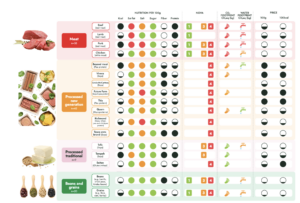As the demand for plant-based meat alternatives continues to grow, the focus is shifting to finding options that balance health, environmental, and affordability objectives. The Rethinking Plant-Based Meat Alternatives report by The Food Foundation presents an in-depth analysis of plant-based meat alternatives in the UK market, providing a clear taxonomy to assess their nutritional, environmental, and economic aspects.
Below is a comprehensive summary of the report:
Introduction
The report highlights the dual crises of environmental degradation and health issues related to excessive meat consumption, particularly in high-income countries like the UK. It emphasizes the need for a shift toward more plant-rich diets, citing recommendations from the National Food Strategy and the Climate Change Committee for significant reductions in meat consumption to meet climate and health goals.
Taxonomy of Plant-Based Alternatives
The authors create a taxonomy categorizing plant-based meat alternatives into three groups based on their level of processing:
1. Processed (new generation): Includes products that closely mimic meat, such as those made by Beyond Meat and Impossible Foods.
2. Processed (traditional): Comprises traditional meat substitutes like tofu and tempeh.
3. Less processed (beans and grains): Encompasses whole plant foods like beans and legumes.
The analysis covers 104 products sold in UK supermarkets, assessing their health, environmental, and price profiles.
Health and Nutrition Profiles
The report finds that all three categories of plant-based alternatives generally contain fewer calories, lower saturated fat, and higher fiber levels compared to meat. However, they tend to have lower protein content. Less processed alternatives (beans and grains) excel in nutrition, being more affordable and healthier than their processed counterparts. Notably, only a third of the processed (new generation) products are fortified with essential nutrients like iron and vitamin B12, highlighting a gap in nutritional adequacy.
Environmental Impact
Plant-based alternatives are shown to significantly reduce greenhouse gas emissions and water footprints compared to meat. The processed (new generation) alternatives have the lowest environmental impact, making them a viable option for sustainable diets. The report underscores the importance of reducing meat consumption to mitigate climate change and promote better health.
Price and Affordability
The report stresses the price disparity between plant-based alternatives and meat, with processed alternatives being considerably more expensive. This price premium can hinder access for lower-income households. Less processed options, such as beans and grains, remain the most affordable and are recommended as a key part of dietary shifts.

Source: Rethinking Plant-Based Meat Alternatives Report
Recommendations
The report concludes with actionable recommendations for various stakeholders:
- For Investors: Highlight the importance of including health and nutrition in investment strategies and advocating for better reporting regulations on food products.
- For Food Businesses: Encourage reformulation of products to reduce salt and sugar levels and improve fortification with key micronutrients.
- For Policymakers: Suggest policies to make healthy plant-based options more accessible and affordable, including fiscal incentives and support for the alternative protein sector.
Conclusion
The report highlights that processed plant-based meat alternatives, though not without their nutritional challenges, can be a vital tool in transitioning to healthier, more sustainable diets.
It advocates for a comprehensive approach to promote plant-based diets, emphasizing the need for collaboration among investors, businesses, and policymakers to facilitate a shift toward healthier, more sustainable food systems. It posits that promoting less processed foods like beans and grains provides a win-win for health, environmental sustainability, and equity.
Key Messages
- Plant-based alternatives offer a significant opportunity to address environmental and health challenges.
- The nutritional profile of these alternatives varies widely, necessitating better fortification and reformulation efforts.
- Price parity with meat products is crucial for wider adoption of plant-based diets.
This summary encapsulates the main themes and findings of the report, reflecting the urgent need for dietary shifts to support environmental and public health goals.
For more information

